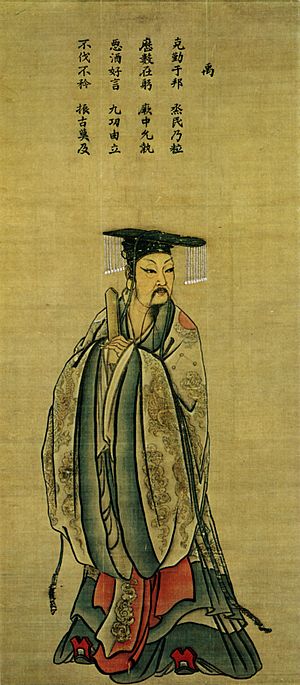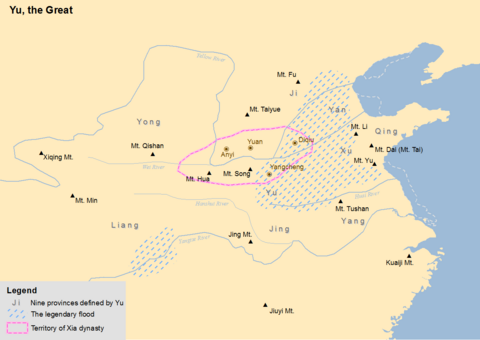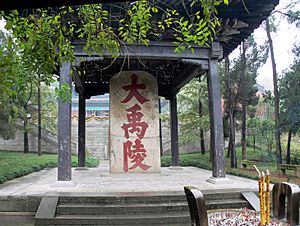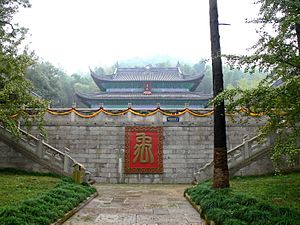Yu the Great facts for kids
Quick facts for kids Yu the Great |
|||||||||||||||||||||||||||
|---|---|---|---|---|---|---|---|---|---|---|---|---|---|---|---|---|---|---|---|---|---|---|---|---|---|---|---|

Song-era depiction of Yu
|
|||||||||||||||||||||||||||
| King of the Xia dynasty | |||||||||||||||||||||||||||
| Predecessor | Dynasty established | ||||||||||||||||||||||||||
| Successor | Qi | ||||||||||||||||||||||||||
| Died | Mount Kuaiji | ||||||||||||||||||||||||||
| Spouse | Lady Tushan | ||||||||||||||||||||||||||
| Issue | Qi of Xia | ||||||||||||||||||||||||||
| Father | Gun | ||||||||||||||||||||||||||
| Mother | Nüzhi | ||||||||||||||||||||||||||
| Chinese name | |||||||||||||||||||||||||||
| Chinese | 大禹 | ||||||||||||||||||||||||||
|
|||||||||||||||||||||||||||
Yu the Great was a legendary king in ancient China. He is famous for controlling huge floods, starting China's first dynasty, the Xia dynasty, and for being a very good and honest leader. He is a hero in the Chinese story "Great Yu Controls the Waters."
Many wise teachers like Confucius praised Yu for his strong morals. He is one of the few Chinese rulers given the special title "the Great" after he died.
It's important to know that there isn't any proof from Yu's time that he existed exactly as the stories say. His name first appeared on ancient bronze pots about a thousand years after he was supposed to have lived.
Contents
Who Was Yu the Great?
Yu the Great was the son of a man named Gun. His family line was said to go back to the famous Yellow Emperor. Yu's father, Gun, was given land in a place called Shiniu, in what is now Beichuan County in Sichuan, China. Yu might have been born there.
Yu's mother was from the Youxin clan. Her name was Nüzhi or Nüxi. Yu's family name was Si, but later it became Xia, after the kingdom he founded. His personal name was Wenming.
As a child, Yu grew up near the Yellow River. People described him as hardworking, smart, and very moral. He later married a woman known as Lady Tushan, and they had a son named Qi.
The Great Flood and Yu's Solution
Why the Floods Were a Problem
During the time of Emperor Yao, huge floods often hit the heartland of China. These floods made it very hard for people to live and for society to grow.
Yu's father, Gun, was given the job of stopping these floods. He worked for over nine years, building many dikes and dams along the rivers. But his efforts didn't work. The floods kept coming.
Yu's Clever Plan
When Yu grew up, he continued his father's work. He studied the rivers carefully to understand why his father's plan failed. Yu worked with Hou Ji, a master of farming, to come up with a new system.
Instead of just blocking the rivers, Yu built a system of irrigation canals. These canals would send the floodwaters into fields, which helped the land instead of destroying it. He also worked hard to dig out the muddy riverbeds.
Yu worked alongside the common people for 13 years. He ate and slept with them, helping with the difficult work of digging. This hard work paid off! The new system stopped the floods and allowed ancient Chinese culture to grow along the Yellow River and other waterways. This amazing project is known in history as "Great Yu Controls the Waters."
Yu's Dedication
Stories say that Yu sacrificed a lot for this project. His hands became thick with calluses, and his feet were completely covered in them. One famous story tells how Yu had only been married for four days when he was given the flood control task. He told his wife he didn't know when he would return.
During the 13 years of fighting the floods, he passed by his own home three times. The first time, he heard his wife was having their baby. The second time, his son could already call out to him. The third time, his son was over ten years old. Each time, Yu refused to go inside. He said that since so many people were homeless because of the flood, he couldn't rest until the work was done.
Yu Becomes Emperor
Emperor Shun, who ruled after Yao, was so impressed by Yu's hard work and clever engineering that he chose Yu to be the next emperor instead of his own son. Yu at first said no, but he was so popular with other leaders that he agreed to become emperor at age 53.
He set up his capital in a place called Anyi and started the Xia dynasty. This is traditionally seen as China's very first dynasty.
Yu's work on the floods made him very familiar with all the different parts of China. He is said to have divided the Chinese world into nine areas called zhou or provinces. These were Jizhou, Yanzhou, Qingzhou, Xuzhou, Yangzhou, Jingzhou, Yuzhou, Liangzhou, and Yongzhou.
After getting bronze from these nine areas, he made special bronze pots called the Nine Tripod Cauldrons. These cauldrons became symbols of his rule.
Yu's Burial Place
Stories say that Yu ruled the Xia Dynasty for 45 years. He died from an illness at Mount Kuaiji, which is south of the modern city of Shaoxing. He was buried there.
Today, you can visit the Yu Mausoleum, which was first built in his honor many centuries ago. It has been rebuilt several times over the years. The mausoleum has three main parts: the tomb, a temple, and a memorial for Yu. Many emperors in ancient times traveled there to honor him.
Was Yu a Real Person?
Historians and archaeologists have debated whether Yu the Great was a real person or a legendary hero. There is no clear proof of his existence from the time he was supposed to have lived. His name only appears in writings and on artifacts much later, about a thousand years after his supposed death.
Some scholars believe that Yu might have started as a god or mythical creature linked to water, and over time, his story changed into that of a human hero who controlled floods.
However, in recent years, archaeologists found evidence of a huge flood at Jishi Gorge on the Yellow River that happened around 1920 BC. This timing is close to when Yu was said to have lived. The problems caused by such a massive flood could have lasted for many years. This discovery makes some researchers think that the stories of Yu the Great might have come from a real person who helped solve a major flood crisis.
Yu's Lasting Impact
Yu the Great has always been seen as an ideal ruler and a wise leader in China. Many places, like Beichuan and Dujiangyan in Sichuan, claim to be his birthplace.
Because of his role in the Great Flood story, Yu is also honored as a water deity in some Chinese beliefs. He is considered the leader of the "Five Kings of the Water Immortals," who are prayed to in temples to protect ships and sailors.
See also
 In Spanish: Yu el Grande para niños
In Spanish: Yu el Grande para niños
- List of Chinese monarchs
- Family tree of ancient Chinese emperors
- Yubu
- Rishu
 | James Van Der Zee |
 | Alma Thomas |
 | Ellis Wilson |
 | Margaret Taylor-Burroughs |




